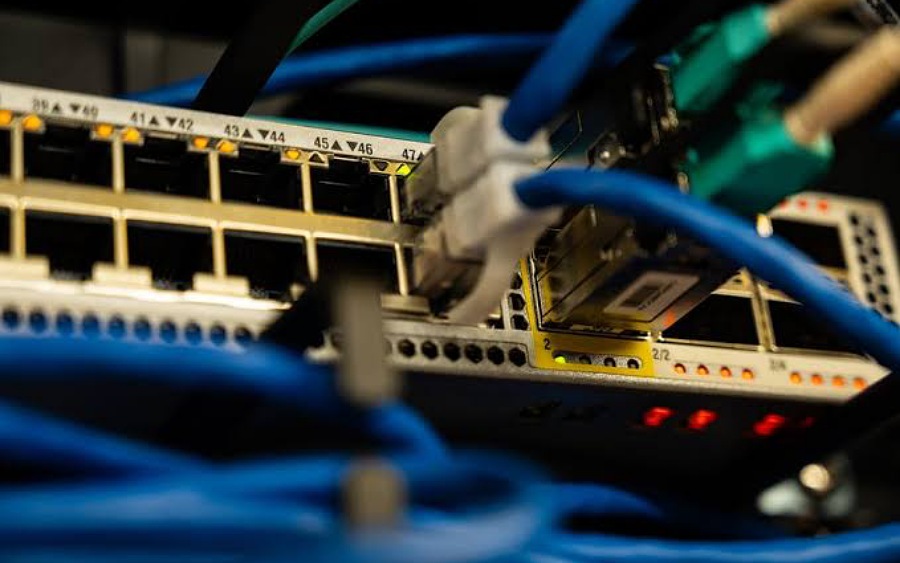Tech
Network Security: 3 Advantages and 3 Disadvantages of Outsourcing

The impact of cyber attack depend on the strength of your network security, which involves advance technical skills and resources in order to lunch a capable cyber security framework.
Only a strong cyber security infrastructure can withstand several threats and vulnerabilities within your system. If you can’t pull this off, outsourcing it is a good alternative.
Outsourcing your network security takes the burden of securing your digital environment off your shoulders, but it also has some challenges. What exactly are the pros and cons of outsourcing network security?
What Is Outsourced Network Security?
Outsourced network security is the process of taking a step back and hiring third-party cybersecurity experts to secure your network. Despite the numerous reports about cyberattacks, many people still believe that these attacks are far away from them. It seems like a news story until it actually happens to them.
Outsourcing network security is a proactive security strategy that helps you prepare for cyberattacks beforehand. Even if you are well-versed in network security, your knowledge probably isn’t as in-depth as that of a cybersecurity professional. Bringing an expert on board helps to identify and resolve the minute security loopholes that may not be visible to a non-professional.
3 Advantages of Outsourcing Your Network Security
Outsourcing your network security offers you several benefits including:
1. Enjoy Expert Cybersecurity Services
The growing popularity of digital technology makes more people tech-savvy. It takes one to have an affinity for technology to own a computer network, so there’s a high chance that you are good with computers. But being knowledgeable about information technology isn’t the same as having cybersecurity skills which you need to secure your network.
Outsourcing your network security gives you access to very skilled cybersecurity professionals who dedicate their time and resources to learning how to secure computer networks. If you were to handle it yourself, you can’t say for a fact that you can secure your network effectively because your skills may be basic. A cybersecurity expert would know what they are doing and address threats from their roots.
Read Also: Cyber Security: 6 tips To Hunt Threat, Safeguard Critical Assets
2. Save Costs by Focusing on Critical Security Needs
Outsourcing network security might seem costly on the surface, compared to handling it yourself. But on the contrary, it could help you save costs. When you work with security professionals, they help you analyze your network to identify the most vulnerable areas that require urgent attention via triage—a process of channeling your resources to the most critical areas of your system.
Instead of spending resources on all and sundry within your network, an expert can help you focus on securing your most critical data and network areas. For instance, implementing strong access controls that keep intruders at bay can prevent tons of cyber threats. A professional can guide you better in this direction. Otherwise, you may spend much more than you should.
3. Implement Custom Cybersecurity
No two networks are the same. There’s a tendency for someone who isn’t a cybersecurity professional to approach it from a generic perspective. You may get some results, but they may not be so effective, especially as you lack the expertise to tailor cybersecurity strategies to your system’s unique environment.
A cybersecurity professional has the training to recognize the differences among various networks. They examine a network down to the letter to outline its peculiarities.
Before proffering a solution, an expert may conduct a penetration test, an ethical hacking method to identify vulnerabilities in your network that cybercriminals would exploit. They may even go further to measure your cybersecurity risk appetite to understand your network’s security standing. Even if you know about these methods, you may lack the skills to conduct them effectively.
Having gathered all the information about the current conditions of your network, instead of implementing textbook cybersecurity practices, an expert will break them down to suit the dynamics of the network.

Network Security: 3 Advantages and 3 Disadvantages of Outsourcing
3 Disadvantages of Outsourcing Your Network Security
There are some downsides to outsourcing your network security.
1. Inability to Prioritize Your Network
If you outsource your network security to an agency, you may not be the only one they work with. They probably have a long list of clients, so their attention may be divided as they cater to each client, making them unable to prioritize your network.
That’s not to say that your network security will suffer outrightly, but they may not be able to respond to issues speedily and resolve them head-on. If you were handling your network security yourself, it would be your topmost priority. You could make the effort to tackle any issues without delay.
You can prevent inadequate attention and immediacy with a cybersecurity outsourcing personnel or firm by signing a service level agreement (SLA) stating that they would give your network the outermost attention. If they fail to do this, you can take legal action.
Read Also: 6 Tips To Ensure Your Data Security
2. Limited Knowledge of Your Network
Implementing effective network security requires an in-depth knowledge of the network in question including its cyberattack history, weaknesses, and strengths. This helps in resolving issues beyond the surface and down to the roots. As the owner or administrator of a network with a good understanding of your cyber environment, you are in a position to manage its security well, but only if you have the right skills.
A cybersecurity professional can gain extensive knowledge of your network if you are willing to work with them. You need to give them all documents and other resources containing the history and activities of your network. With your cooperation, they will understand your network beyond the surface level and render their services to suit its specific needs.
3. Privacy Concerns
Data privacy is key in network security. The fewer the number of people with access to your network, the more secure your data is. When you outsource your network security, you grant third parties access to your network data.
In as much as the cybersecurity expert or vendor may claim to operate in utmost confidentiality, the fact remains that they have access to your private information. Even if they don’t have any malicious intentions, someone else could steal your login credentials from them and access your network, so it’s best to limit the number of people who have access to your network.
You can maintain data privacy when outsourcing your network security with access control best practices such as least privilege, where you grant users access to only areas that concern them. Don’t grant the professional complete access to your network. Restrict their access to the scope of their work. Pay close attention to their services, so you can detect any malicious actions or behaviors from them.
Tech
Top 10 States With The Highest Number Of Internet Users In Nigeria

The digital landscape in Nigeria has seen significant growth over the years, with more citizens gaining access to the internet.
This has been largely driven by improved telecommunications infrastructure, affordable mobile devices, and the growing digital awareness among the population.
As of the fourth quarter of 2023, data on internet usage across the country reveals fascinating insights into which states are leading in digital connectivity.
According to the data released by the National Bureau of Statistics (NBS) internet subscriptions in the country stood at 163.8 million at the end of 2023.
Based on the NBS data, here are the top 10 states with the highest number of internet users in Nigeria as of Q4 2024:
10. Delta (4.4 million)
Rounding off the list is Delta State, with 4.4 million internet users. Known for its oil production, Delta is also making strides in the digital world, contributing to the diverse landscape of internet users in Nigeria.
9. Katsina (4.6 million
Katsina State, with 4.6 million internet users, is another northern state on the list, showcasing the expanding reach of digital connectivity beyond Nigeria’s major urban centers.
This growth is a testament to the increasing awareness and adoption of digital technologies in the state.
8. Adamawa (5.4 million)
Adamawa State stands out in the northeastern region with 5.4 million internet users. Despite facing challenges, the state is making significant progress in digital inclusion, bridging the digital divide in the region.
7. Rivers (5.6 million)
Rivers State, with its capital in Port Harcourt, is not just an oil-rich state but also a burgeoning center for technology and innovation in the southern part of Nigeria, with 5.6 million internet users.
The state’s efforts in leveraging digital technology for economic development are evident in its internet usage figures.
6. FCT (5.8 million)
The FCT, encompassing Nigeria’s capital, Abuja, boasts 5.8 million internet users. As the administrative and political heart of Nigeria, it’s no surprise that the FCT is among the leaders in digital connectivity, with many government and private sector initiatives pushing for greater internet penetration.
5. Kaduna (7.4 million)
Kaduna State is another northern state making waves in the digital world, with 7.4 million internet users. The state has been proactive in embracing technology, aiming to become a northern tech hub, which is reflected in its growing internet user base.
4. Oyo (8.4 million)
Oyo State, known for its rich cultural heritage, is also making strides in digital engagement with 8.4 million internet users. Its capital, Ibadan, is becoming a significant tech cluster, fostering digital education and innovation.
3. Kano (9 million)
Kano, one of the largest cities in Nigeria’s northern region, comes in third with 9 million internet users. The state has historically been a center of commerce and trade, and its adaptation to digital transformation has been commendable, making it a leading state in the north for internet usage.
2. Ogun (9.5 million)
Following Lagos is Ogun State, with 9.5 million internet users. Ogun’s strategic position as a neighbor to Lagos and its efforts in improving its ICT infrastructure have made it an emerging center for technology and industrialization, attracting more people to the digital space.
1. Lagos (18.9 million)
Topping the chart is Lagos, the commercial hub of Nigeria, boasting an impressive 18.9 million internet users. The state’s advanced infrastructure, coupled with its status as a business and tech hub, significantly contributes to its high internet usage.
Lagos is not only the most populous city in Nigeria but also a melting pot of cultures and businesses, making it a hotspot for digital activities.
Tech
El-Rufai Launches $100 Million Afri-Venture Capital Company

Nasir El-Rufai may no longer be the Kaduna State governor and has missed a controversial ministerial appointment, but he certainly has not lost his zest for taking on big projects. The former governor is going into the private sector with a loud statement.
El-Rufai plans to launch a $100 million venture capital fund for startups in Nigeria, particularly those in the Kaduna tech ecosystem. He plans to match his ambitions with actions. He is willing to stake $2 million of his money for the offtake of the fund. He plans to convince investors to provide the remaining funding. The investors will mostly be those “who believe in us but don’t have the capacity or the time to do the analysis and evaluation. But they trust our judgment and they will come with us.”
He was in Marrakech in November for the Africa Investment Forum where he spoke to BusinessDay.
The former governor who played a significant role in the emergence of the current Nigerian president as the party’s candidate, seems to have put his disappointments behind him.
In Marrakech, there was no trace of the man who became the target of much social media trolling. The El-Rufai that showed up in Marrakech was looking spritely and took part in all the sessions of the Africa Investment Forum, a multi-stakeholder, multi-disciplinary platform with the vision to channel capital towards critical sectors to achieve the Sustainable Development Goals, the African Development Bank’s High 5s, and the African Union’s Agenda 2063.
According to him, he wants to set up a venture capital fund or private equity that will invest in young Nigerians with innovative ideas. It doesn’t matter what segment of the economy the ideas are. It could be in agriculture. ICT or the creative industry, so long as it has the potential to add value to the world, these are the ideas that El-Rufai and his fund will target.
During his tenure as governor of Kaduna, El-Rufai said he met many students in Kaduna who had great ideas and were creating innovations. However, many of them did not have someone to mentor them and help those ideas grow.
“What young people need is essentially mentoring and financing to get things going. They develop the idea and see whether it is viable. And we will open doors for them because they don’t have contact. They don’t know or have access to ministers, presidents, or regulatory agencies. We do. We know the minefields that they have to navigate. We know that they need to give them appointments and we can provide them with the startup funding and in return we take an equity position.
We don’t want to take your business; we want to develop it. But if we take the risk on you, we will take a percentage of the business,” El-Rufai said.
He is working with select private sector partners, including Eyo Ekpo, co-founder of Excredite Consulting Limited, and their primary focus is on Nigeria but the ambition is Africa because he projects from a report that Africa will be supplying the world with a significant portion of the workforce it needs by 2050.
According to a report by the Guardian, by 2050, Africa’s population is expected to reach 2.5 billion, which is about 25 percent of the world’s population.
El-Rufai says such projections call for more investments in the younger demographic. However, his fund will not just be focusing on new startups, there is also a plan to engage established companies with management problems that are still viable. The VC fund will invest in such companies, get them sorted out and take them to exit.
“We don’t intend to remain in any business. We want to catalyse growth in these startups,” he said.
One of the goals of being at the African Investment Conference was to seek continental partnerships, and investors and to explore opportunities with climate-focused investors.
“Nigeria has a lot to offer Africa and the world. Our population, entrepreneurial capability, the innovation of our young people and their boldness and courage to find success. We just felt that we have a duty to encourage,” he said.
The first fund will be investing for three to four years. The fund is expected to launch early next year and the company will be headquartered in Abuja. This is to diversify the funding beyond Lagos because there is already a lot of interest in funding innovation in Lagos. El-Rufai and his partners want to spur startup funding interest in ecosystems in Kaduna, Abuja and other parts of the country.
-

 News1 day ago
News1 day agoBDCs now buying dollar at ₦980 — ABCON President
-

 Business1 day ago
Business1 day agoSeplat Energy celebrates a decade of Dual Listing with Bell Ringing Ceremony at Nigerian Stock Exchange
-

 Metro1 day ago
Metro1 day agoOsun Poly Student, Olanrewaju Olatona killed by hit-and-run one-way driver
-

 Headline1 day ago
Headline1 day agoFagbemi warns against obstructing EFCC from performing its lawful duty
-

 News1 day ago
News1 day agoLASG’s maize palliative impactful, says poultry association chair
-

 News1 day ago
News1 day agoWoman killed while crossing road in Anambra




